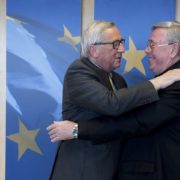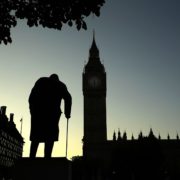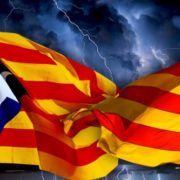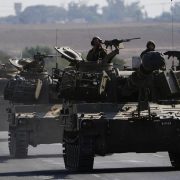The fog of new tensions is thickening between USA and Russia, caught in a spat on rivaling spying plots – the US approved new sanctions against Moscow for its alleged hacking during the past presidential elections and Russia kicked out about 755 American diplomats in reprisal. All while ominous new vapors of war are wafting around North Korea, as President Donald Trump voiced his disappointment at China’s inability to bring down Pyongyang and Beijing responded, piqued, that the problem did not arise in China and that all sides need to work for a solution.
Against this volatile backdrop the Vatican Secretary of State cardinal Parolin is going to Moscow at the end of August in a historic mission that will turn a new page in the action and role of the Holy See in the world of this pontificate. In a recent interview [1], Parolin reasoned that: «The diplomacy of the Catholic Church is a diplomacy of peace. It does not have power interests: neither political, economic, nor ideological. For this reason, it has greater freedom to represent the reasoning of one side to the other side, and make both aware of the risks that a self-referential vision can entail for all…The Holy See does not seek anything for itself. It is not present here and then there to not lose on any side. Its attempt is one that is humanly difficult but evangelically unavoidable, so that nearby worlds return to dialogue and stop being torn apart, by hate even before the bombs».
Earlier, in his speech to the US Congress, the Pope made the same argument, as Parolin quotes in the interview, but here the role of the Church appears clearer. The Church will work with no political, economic, or ideological agenda for peace, and in this it fills a gap that has become more urgent in this present world. Big, medium, and small powers all have their own interests to protect and do not trust each other.
The old order, that was frozen by the Cold War, has collapsed, and the US is the sole superpower, but it is not a “total power,” able to impose its will on the world, as years of policy failure in the Middle East prove. In this situation, an entity like the Catholic Church, with a global reach and organization but no agenda for itself, can provide the necessary glue of trust lacking now in modern politics.
The Church in fact has a “political” interest in trying to find the best solution for everybody, but no partisan interest of its own of any singular party. In this it can bring an approachthat looks at reality in truer sense, for what it is and what can be for everybody’s good, not for the good of any singular party.
In this it is particularly interesting how the Pope and Parolin stress that the Church also has no “ideological interest” to protect. That is, the Church will not side with “capitalism” or “socialism” or any other ideology. It is not an ideology; it is a religion and will move according to reality and its own religious and moral principles. It is not in favor of or against any ideology in principle; it is different from any ideology because it is a religion.
In this effort for peace, the Church can find many friends. Other religions, which have the same thrust for peace, are natural allies, and the Church has been trying to reach out to them for decades. There are also non-religious NGOs that feel a duty to the world, and then there are the states that have in principle an interest in resolving their controversies peacefully, not with war.
In this the Church tries to work for peace, like Saint Francis who famously went to see the sultan of Egypt Saladin in 1219 in an attempt to put an end to the Crusades. The attempt failed but it made a mark and set an important precedent for the Church. Interestingly, almost a century laterin his Divine Comedy Dante put Saladin in the limbo among the “Great Spirits”, with Plato and Aristotle.
Actually this mission of the Church responds to actual needs. For a century the world has recognized the need for third-party mediation. At the end of World War I, all powers saw the need for a new structure besides the States. This brought about the League of Nations, which failed. After World War II, the winning powers went to it again with the UN, which also, since the end of the Cold War, is producing diminishing returns.
If the Church doesn’t play this role now, then nobody will. This doesn’t mean turning the Church into an exalted NGO and giving up its religious and moral mission. Quite the opposite: because it is a religion and it has high moral obligations but no power agenda, it can possibly produce different, better results than an NGO.
In this case, the situation in Russia may require greater support from the Church. In many ways President Vladimir Putin already recognizes this, by promoting the role of the Orthodox Church, of which he is patron. The fact that he has invited Parolin and he is clearly mulling inviting the Pope to Moscow proves that Putin is also considering all the positive elements for him of having the Russian Orthodox Church better linked to the Catholic Church. For the Holy See, it brings up the very important religious issue of unity of the Christians, but it also has, realistically, significant political consequences. Hooking the Orthodox to Rome gives the Moscow church a freer and more credible voice in the world and has Rome helping it.
Despite what certain press says about Putin, Russia is now very weak and on the brink of an existential crisis.
Oil, the main source of foreign revenue, does not fetch a high price. The price of oil has settled around a price-tag convenient for the US shale producers, who are now setting prices worldwide. Without a windfall of returns from oil, Russia exports raw materials, where there is no exclusivity, and weapons, which are not as advanced as those of other countries and need preparation for war to have a market.
While the economy is crumbling and the hundreds of protests are a symptom of it, its geopolitics, the grand ideal bolstering the existence of Russia, is in jeopardy. Syria, Moscow’s historic ally in the Mediterranean, hosting a Russian port in Tarsus, is torn by war and holds on by a thread thanks to Russian and Iranian support. Ukraine, for some the cradle of the Rus with Kiev, has become a bitter thorn in Moscow’s side, with an unresolved and simmering war on the east side.
Those on the Asian frontier, the territory where Peter the Great reached out and founded modern Russia, are shaking. Mongolia and the Central Asian “Stans”, once part of Moscow’s empire, are falling under the Chinese clutch. Even the immense swathes of land of eastern Siberia, wrested by Russia from the Manchu and the Mongols through 200 years of war, are falling under Beijing’s spell by the magnetic pull of its economy.
Finally, the grand bet with US President Donald Trump is backfiring. The entente cordiale that Russia was hoping to achieve through the new American head of state is instead putting Moscow more on the spot. The US press portrays Putin as the ultimate puppeteer and Trump as the real Manchurian Candidate. In this situation, many in the world are, again, playing with the idea of carving up Russia. Moscow in this needs external help and needs to reform its economy and society, which can’t rely only on a bunch of oligarchs whose perks depend on their proximity to Putin.
In this situation, the Church has no economic, political, or ideological agenda, as Parolin put it. It wants peace. Realistically it wants to find solutions in Ukraine and in Syria, and get closer to the Russian Orthodox. But it doesn’t want the power of Catholics to prevail on that of other people; it doesn’t want to make the Catholics in Ukraine or Syria a party that has to rule over other religious parties. It rather believes that the local Catholics and the Holy See in Rome can be the yeast bringing all closer together.
This has a political element also for China. The military stall between Beijing and New Delhi over Doklam, now over a month old, bodes ill for peace in Asia. Both have good ties with Moscow and are great consumers of Russian armaments. The two countries, totaling about 3 billion people or 40% of the world population, sit at the center of multiple hot spots. China has tensions in the Korean peninsula, over the Senkaku Islands with Japan, in the South China Sea, and with India. India has tensions—and a decades-old state of low-intensity war—with Pakistan, troubles with Sri Lanka, and bigger troubles with China.
Stability in Russia, meaning sense of security internally and internationally, would also bring greater stability in Asia and with China and India, for instance.
As Parolin said: «Certainly, compared to past times, now new challenges have cropped up that call for unprecedented and creative responses, but in the end the aim of the Church has always been the same, and it is by nature pastoral: bring God to man and man to God. Specifically, the Catholic Church asks that it is guaranteed the right to freely profess one’s faith for the benefit of everyone and for harmony in society. Catholics wish to live their faith serenely in their respective countries like good citizens, working toward the positive development of the national community».
[1]http://www.ilsole24ore.com/art/commenti-e-idee/2017-07-27/interview-with-cardinal-pietro-parolin-vatican-s-top-diplomat-moscow-and-beijing-are-the-new-interlocutors-waiting-for-europe-075728.shtml?refresh_ce=1





